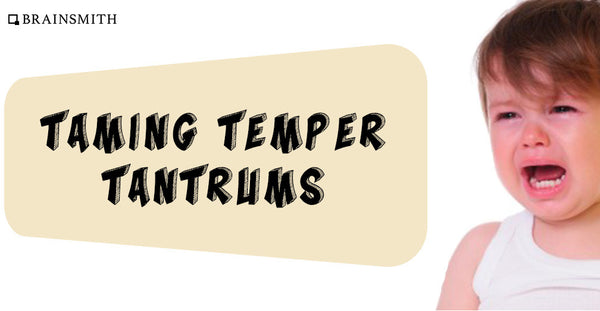Taming Temper Tantrums: What You Should Know
Posted on July 21 2016

Why are temper tantrums so difficult for parents to handle?
Besides the fact that they’re loud, annoying and embarrassing, we often feel it’s our job to make our kids act the way we feel they should behave. If we can’t do that, we feel ineffective. We also don’t like the judgments that we imagine others making when our kids are out of control. We don’t know what to do, but feel we must do something—after all, we are the parents.
So let’s look at some of the ways on how to deal with these outbursts.
Seven Effective Ways To Diffuse Temper Tantrums
1. Hold on to your principles
In a relaxed moment, sit down and think about how you want to behave under the worst kind of stress. This is really key, because if you’re going to go by your ‘emotion of the moment’, you’ll often end up losing your cool.
2. Try to avoid your child’s “triggers” if you can
Try to avoid triggers that you know will set your child off. Physical triggers are very common. For younger children especially, make sure they’re getting proper rest and food and that they’re not over–extended.
3. Be a good role model
Be a good role model in terms of your own behaviour. Decide how you will behave, no matter how your child's behaviour. Ask yourself this question: “How can I be calm when my child becomes aggravated?” instead of “How can I get my child to calm down?”
No one can control how another person feels. And the more you try to manage your child’s reactions, the more they will probably act it out.
4. Do not give into your child’s request
If you give in to your child’s requests when she/he has an outburst, it will set up a pattern where you create more tantrums. In effect, you’ve taught your child that the best way to get what he wants is to scream, yell, and be out of control.
5. Give Your Child Some Space
Sometimes, all your child need is to just get out the irritation or anger. At such times just let them be. They're able to get their feelings out, pull themselves together, and regain self-control -- without engaging in a yelling match or battle of wills with you.
6. Use empathy
When your child is in the middle of a tantrum, it’s important to be empathetic but not give in or lose it. If it’s appropriate, you can say, “I know it’s very frustrating, I understand you wanted to get this video game today.”
7. Be consistent
It is very important for you as a parent to maintain consistency. This helps your child understand what is appropriate and what is inappropriate. Inconsistency may get the child confused thus leading into bigger fixes.

After the Storm
- Do not reward your child's tantrums by giving in. This only makes your little one understand that their tantrum was effective and can do it again next time. Rather, praise them verbally for regaining control over themselves.
- Your child may be vulnerable after a tantrum when it is ineffective and even normally, they feel that they are being less adored and that you don't love them. At such times hug your child and give them assurance that you love them no matter what.
- Make sure your child is getting enough sleep. When children don't get enough sleep, they tend to become disagreeable, hyper and show extreme behaviour. Based on their age most of the kids' sleep within a set range of hours, but each child is unique and has their different sleep needs.
Conclusion
Make sure to incorporate behaviour change for a longer term than a short one. Plan how you would deal with your child in situations which would also define your relationship with your little one through their ups and downs. It is important that you influence him/her in a positive manner than control them. In my opinion, this would be the best road to bringing up a well-understood child and also building a stronger relation with your child.
About The Expert
Namrata Jain is our Consulting Psychologist at Brainsmith. She has a Masters in Psychology from Mumbai University and has worked with children and adults to help them achieve a better state of mind by encouraging healthy mental and behavioural growth.
